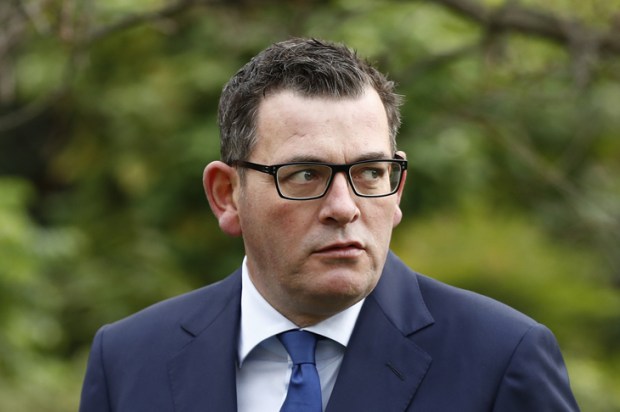Simon Collins
A British newspaper once ran a TV ad extolling the virtues of journalistic objectivity. ‘Point of view’, which you can still find on YouTube, is a sequence of three pieces of grainy street footage, all showing the same event, but each shot from a different CCTV. The first shows something with which 1980’s UK audiences would have been depressingly familiar; a shaven-headed, bovver-booted youth sprinting through a town centre (full disclosure; it’s me). The second shows the skinhead confronting an older gentleman with the apparent intention of mugging him. The third shot reveals the skinhead’s actual intention; to push the pensioner out of the way of a falling pallet of bricks, thereby saving him from injury. ‘An event seen only from one perspective,’ says the voiceover, ‘gives only one impression. It is only when you get the whole picture that you can really understand what’s happening.’ The newspaper in question then had a reputation for high professional standards at that time, so the ad won awards and was taken very seriously. But many who watch it today would find it hard not to laugh out loud at the closing frame, in which this champion of unbiased, even-handed, reportage is revealed to be the Guardian.
I thought about this while comparing the different approaches taken by different news outlets to the allegations about Joe Biden’s involvement in his son’s business ventures. Predictably, Trump-supporting Fox accorded the story huge significance. Just as predictably, CNN and other Biden barrackers brushed it off as irrelevant. The Guardian, being a veteran of more campaigns than any of them, went one step further. Rather than just ignoring the allegations, it turned Fox’s coverage of the story into the story. ‘The Hunter Biden story is a crucial moment: does Twitter care more about fact-checking than News Corp?’ was the 21 October headline, with the subhead; ‘Tech firms, newly sensitive to fake news, stopped the story circulating. Now the global media giant has roared in outrage.’
Not only did this distract from the real issue, but it also gave fellow-traveller Twitter, which had been blocking Hunter-related tweets, a retroactive out for not blocking earlier and completely unsubstantiated allegations about Donald Trump’s connections with Russia. But perhaps the most impressive part of the Guardian’s dismissal of the Hunter Biden scandal was the spectacular editorial volte face which that required. On 5 October, 2019, when Joe was still just one of six contenders for the Democratic nomination, it ran the headline ‘We need to talk about Hunter’ along with the unambivalently damning subhead ‘The growing scandal around Ukraine shows a Biden nomination would be a big gamble – one that Democrats would be foolish to make’.
Nobody in Australia should be surprised by such double standards. By the time Malcolm Turnbull had brokered the 2013 launch of the Guardian’s digital Aussie offspring (his boast about doing so in his recent memoir removing any lingering doubts about Mr Turnbull’s true political instincts), its pommy parent paper had abandoned any aspiration to editorial objectivity. And for good commercial reasons. Eschewing the capitalist paywalls pioneered by the evil Murdoch press may have cornered the younger, left-leaning readership market. But continuing to do so after it became clear Rupert’s online gamble had paid off also painted its proprietors into a revenue corner.
If enough of those readers had responded to the begging letter which appends each article, something like editorial independence might have been maintainable. But this was the Spotify generation; the one which doesn’t believe it should pay for anything. Catering to their politics, moreover, precludes doing business with a lot of very big advertisers. Like so many digital platforms, Guardian Australia owes its survival to giving a lot of people what they know those people like rather than offering them something they might not.
So it has joined the ever-expanding list of once respected institutions whose founding principles have, thanks to unrelenting pressure from the Left, undergone a truly Orwellian inversion in recent years. Instead of teaching our children to be proud of their forebears’ achievements, our schools now fill them with shame. Instead of encouraging young people to question orthodoxies, our universities now hand out blinkers. Instead of fighting for the interests of blue-collar workers, our Labor party now prioritises ideologies which threaten those workers’ jobs. And instead of striking fear into the hearts of our enemies, our armed forces are now terrified of being insufficiently diverse.
But of course, that’s all just one point of view.
Kel Richards
An expression has just been coined to describe the age in which we live: ‘consensual hallucination.’ It was coined by one of Britain’s former (now retired) top spies. David Omand was once the head of GCHQ and chairman of the Joint Intelligence Committee. He says his coinage ‘consensual hallucination’ means ‘the instinct to believe what our group believes.’ This human instinct (which now has a name) explains such groups as Extinction Rebellion. How else can you explain an otherwise sane person believing the human race is about to become extinct? It also explains the #IStandWithDan group mentality – in which otherwise perfectly sane people choose to believe that the man whose government allowed the virus to escape from hotel quarantine and who then put them under house arrest is doing a good job. That is ‘consensual hallucination.’
Another expression we need is ‘losers’ consent.’ It was Nigel Farage who introduced me to this term at last year’s CPAC and I thought it was a clever coinage (and clever concept). However, it turns out that Nigel didn’t come up this. It was the title of book published in 2005 called Losers’ Consent: Elections and Democratic Legitimacy (OUP) written by a bunch of five academics headed by Christopher J. Anderson (who appears to have originated this phrase). When I first heard ‘losers’ consent’ I mentioned it to Chris Kenny who saw its importance immediately, seized on it, and has used it often since in his columns and commentaries. It’s an expression that is yet to make it into the dictionary.
Both the Oxford and Merriam-Webster’s have ‘informed consent’ but neither (so far) have ‘losers’ consent.’ (I suspect it’s only a matter of time.) The point is that in any election there are both winners and losers. If both don’t accept the result there is a problem. Disputed returns are one thing, but it’s entirely different when a clear result is rejected. This is what has been going on in America for the last four years – a lack of ‘losers’ consent.’ From Hillary’s insistence that she really won, to the Russian collusion fiasco, to the impeachment, to mainstream media aggression, to students carrying placards saying ‘not my president.’ Together that amounts to a massive fail of ‘losers’ consent.’
Four years of that has divided America (and will now make it hard for Joe Biden to be seen as legitimate). Without healthy ‘losers’ consent’ democracy begins to wobble dangerously.
Contact Kel at ozwords.com.au
Got something to add? Join the discussion and comment below.
Get 10 issues for just $10
Subscribe to The Spectator Australia today for the next 10 magazine issues, plus full online access, for just $10.
You might disagree with half of it, but you’ll enjoy reading all of it. Try your first month for free, then just $2 a week for the remainder of your first year.














Comments
Don't miss out
Join the conversation with other Spectator Australia readers. Subscribe to leave a comment.
SUBSCRIBEAlready a subscriber? Log in